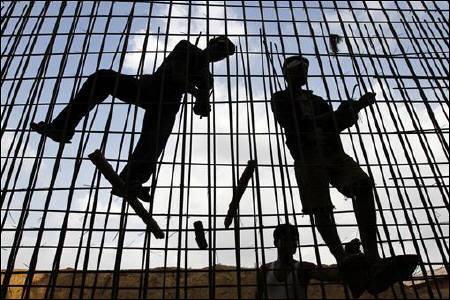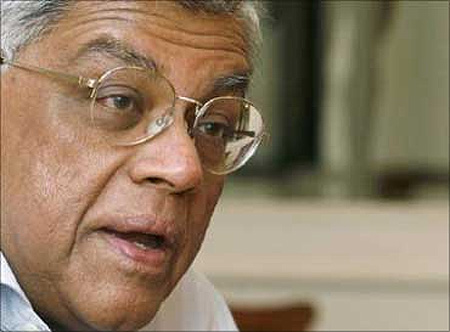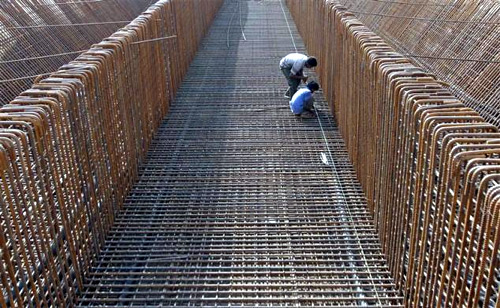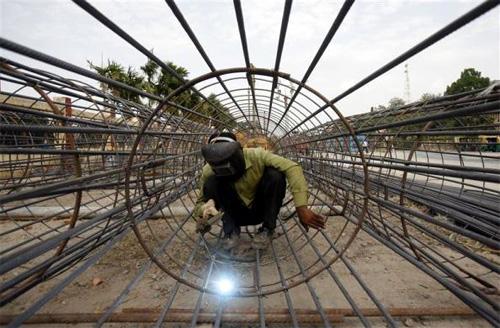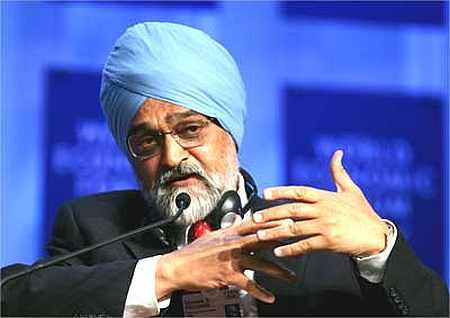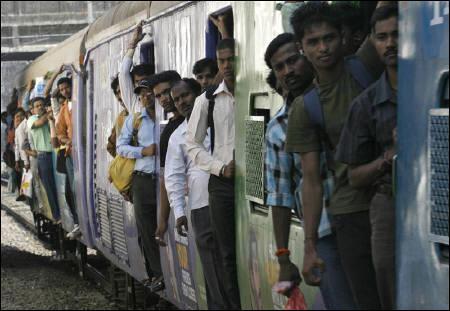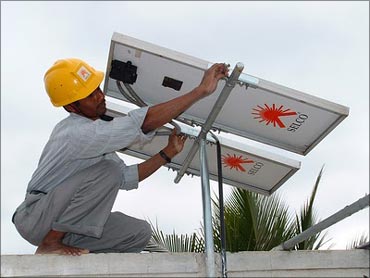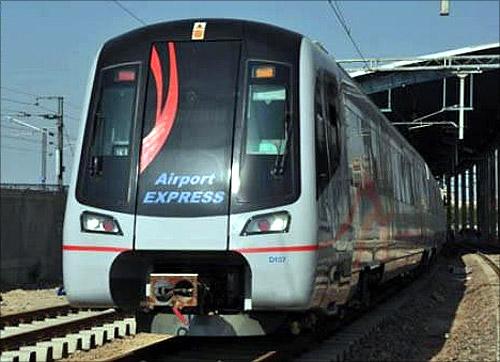 | « Back to article | Print this article |
The A to Z of India's most controversial sector
Familiarity with the alphabet is important to understand the language of the country's most controversial sector, writes Vinayak Chatterjee.
A: A is a busy alphabet. There is "auction", which is the buzzword now. And, "allocation" that nobody likes. "Arbitration" is a necessary evil. "Aggressive" bidding is the bete noire of public-private partnership (PPP). "Airport" development comes in two flavours - airport development fee and user development fee. And, there is "annuity" when BOT (build-operate-transfer) fails.
B: Rattling off "BOT", "BOO" (build-own-operate), "BOOT" (build-own-operate-transfer) at infrastructure seminars identifies you as an expert. "Bhel", the expert in power plants, is now up against domestic and foreign power play.
C: C is by far the most popular alphabet typifying Indian institutions - CAG, CCI,CBI, CERC, CEA, courts and the Cabinet Committee on Infrastructure. Along with "concessionaires", they all add to the buzz of the great Indian projects bazaar. But the Big C right now is "coal".
(Comptroller and Auditor General, Competition Commission of India, Central Bureau of Investigation, Central Electricity Regulatory Commission, Central Electricity Authority)
The writer is the Chairman of Feedback Infrastructure.
The A to Z of India's most controversial sector
D: D is for "Deepak" Parekh, the revered godfather of infrastructure finance. The other D is for "discoms", currently valued at a whopping Rs 1,90,000-crore worth of bailout. "Dedicated" freight corridors are going to speed things up.
E: As every schoolchild knows, E is for "environment". This E is blocking India's march to progress, even though other Es like "expressways" and "EPC" (engineering, procurement and construction) contracts are straining at the leash.
F: F follows E. "Forests" stand in the way. Our national wealth lies beneath this F. That is why "FSAs" (fuel supply agreements) are so difficult to sign with the Big C. Pranab babu, curiously, put "fertiliser" in the infra definition.
Click NEXT to read more...
The A to Z of India's most controversial sector
G: G is for "government" - under whose benevolent gaze projects struggle to reach completion. Developers from "GVK" to "GMR" jostle for opportunities while counting lessons in kindergarten now start as 1G, 2G, 3G, 4G...
H: H is for "Haldea", Gajendra Haldea. No other H matters. His detractors are legion and would like us all to believe that if his guiding hands were not to guide, Indian infra would have moved 10 times faster. This is clearly an uncharitable view. Those who love the infra sector, love him.
I: Infra is ever hungry for "investments". And, "IDFC" leads the way. Insurance, foreign institutional investors, foreign direct investments, external commercial borrowings, private equities, pension funds, provident funds, tax-saving bonds, small savings, gold bonds, black money bonds, round-tripping bonds - everything is welcome, because it is for nation-building.
Ministers, bureaucrats and fund managers are constantly traipsing to the world's hot-spots to garner investments. And, it is never in rupees crore, always in billion dollars.
Click NEXT to read more...
The A to Z of India's most controversial sector
J: "JNNURM" (Jawaharlal Nehru National Urban Rural Mission) is the flagship urban programme supposed to reform our cities. What the public sees is a few more buses with JNNURM splashed across their sides. Without "Jairam" Ramesh, land and toilets would not be in the national psyche.
K: K is for "kilowatt". India needs thousands of kilowatts to make bulbs glow in village huts. In this effort "Kudankulam", India's first 100-Mw atomic power plant is about to go critical, with protesters waist-deep in the ocean.
L: L can only be for the "Land" Acquisition Bill. Or, more correctly, the Right to Fair Compensation, Resettlement, Rehabilitation and Transparency in Land Acquisition Bill 2012.
Around 66 per cent or 80 per cent or 90 per cent farmers have to say yes, so that the country can move ahead. "Larsen and Toubro", the big daddy of the sector, has been given a distinct identity by Mr Chidambaram: "L&T is neither private sector nor public sector, but national sector."
Click NEXT to read more...
The A to Z of India's most controversial sector
M: M has to be for "Montek" - Montek Singh Ahluwalia, deputy chairman of the Planning Commission and the high priest of the infra policy temple. M connotes the "metro"-rail movement sweeping across India's top cities. It is also for "mineral", which lies under F.
N: "NIB", or the National Investment Board is the new kid in town. Another N, Ms "Natarajan" is against NIB. The banking sector would have us believe that N stands for "NPAs" (non-performing assets) - of which the infra sector constitutes about 50 per cent.
There are many heavyweight Ns among infra PSUs - NTPC, NHAI and NHPC. Then, there is "NAC" (National Advisory Council), which is just six alphabets away from G. Ubiquitous NGOs are forever meddling on project sites and "non"-bailable warrants become important in T.
O: O is for "open access" in power distribution. This could have been classified under C for closed access, since states try every trick in the book to prevent this O whilst the Centre growls and fulminates.
Click NEXT to read more...
The A to Z of India's most controversial sector
P: The "PPP" of public-private partnership is now well seeped into the DNA of India's polity. The more recent PPP is the "PMO", "Pulok", "power thrust". Just ask the Coal India board. And, we cannot move on without a deferential bow to the all-encompassing P - the "Planning Commission".
Q: Q is for the golden "quadrilateral", a geometric shape made popular by the National Highways Authority of India's flagship programme.
R: R is heavily loaded with "railways", "regulatory" authorities and "renewable" energy. But the real R, is Dr "Rakesh" Mohan whose seminal India Infrastructure Report in 1997 set the stage. His 2002 report on reforming the railways still gives shivers to the railway establishment.
Click NEXT to read more...
The A to Z of India's most controversial sector
S: "Spectrum" and "scam" have pride of place in the lexicon. Following closely is "SPVs". Everything in infra happens through special purpose vehicles, because promoters and developers are very special people. The "solar" mission is the renewables' sunshine.
T: With the great grid collapse fresh in memory, "transmission" deserves to be mentioned before "tariffs". And then, there's the great "telecom" revolution built on "TRAIing" harder each time. "Tihar" is spoken in hushed tones.
U: U is for "UI" (unscheduled interchange) - the little piece of jargon that played a key role in the grid collapse. U is also for "urban ministry". With J, metro-rail and urbanisation (horizontal and vertical) under its jurisdiction, it has far more to do now than allocate bungalows in Lutyen's Delhi.
Click NEXT to read more...
The A to Z of India's most controversial sector
V: V is the magic wand - "viability gap funding". With an imperious swish of this wand, any unviable project can be instantly made viable.
W: River-linking is unfashionable in the UPA regime, but inland "waterways" is in.
"Wasteland" can produce solar power and jatropha and also be given to industry, instead of triple-cropped fertile land.
"Waste" to energy is popular in conversations; as is depleting "water" table. "Windpower" is chastised for being driven not by wind, but by tax-breaks and concessions.
Click NEXT to read more...
The A to Z of India's most controversial sector
X: X is for those little extras of life, like a little "extra" coal allocation or a little "extra far". There is the "X-factor" - like how much gas is there in the KG basin? Or, when will Delhi Airport Metro commence?
Y: Y is for planning, yes, yes - the Five-"Year" Plans. Trillions of dollars will soon replace today's billons.
Z: "Zero" could be positive or negative, like zero load-shedding; or zero-coal stocks. Or, it could be wildly popular - like zero tolerance for crony-capitalism.
Click NEXT to read more...
